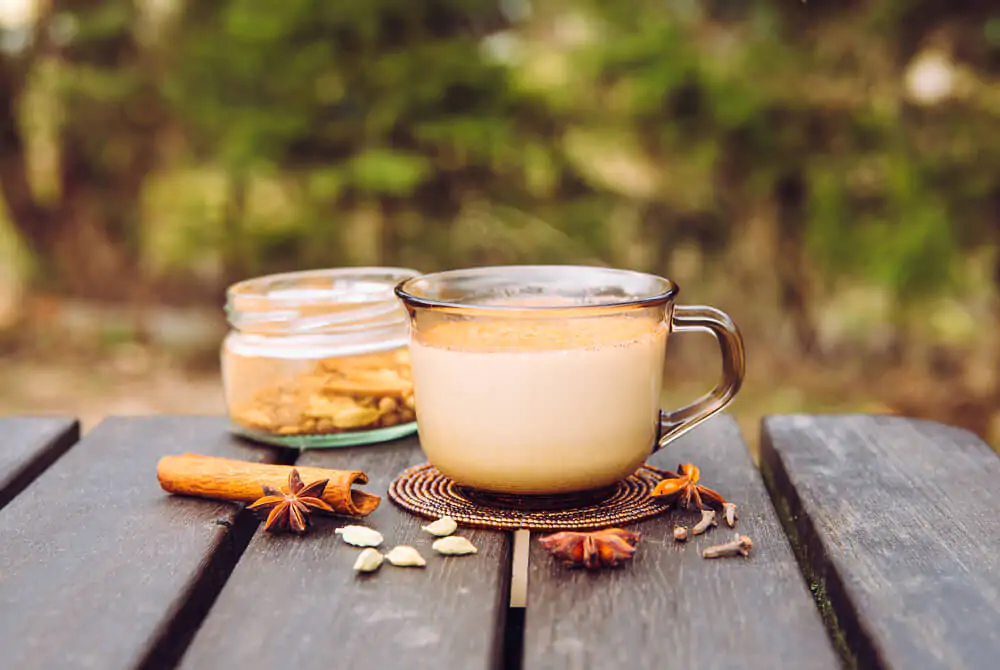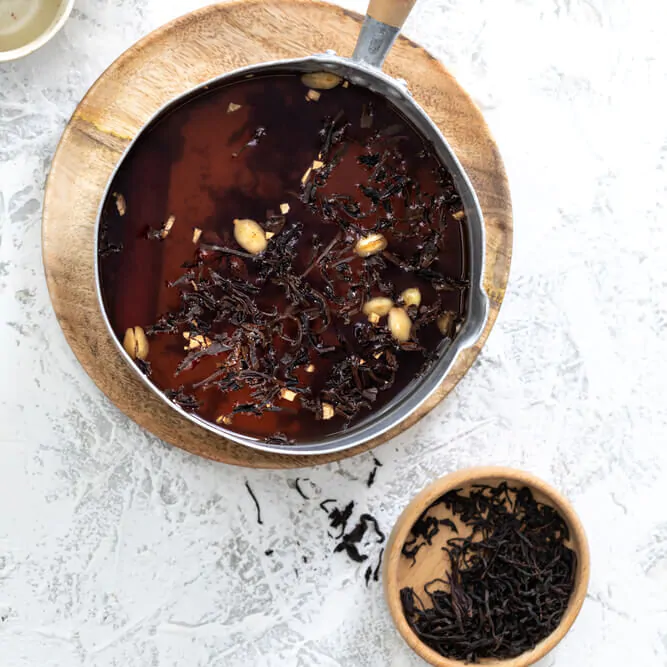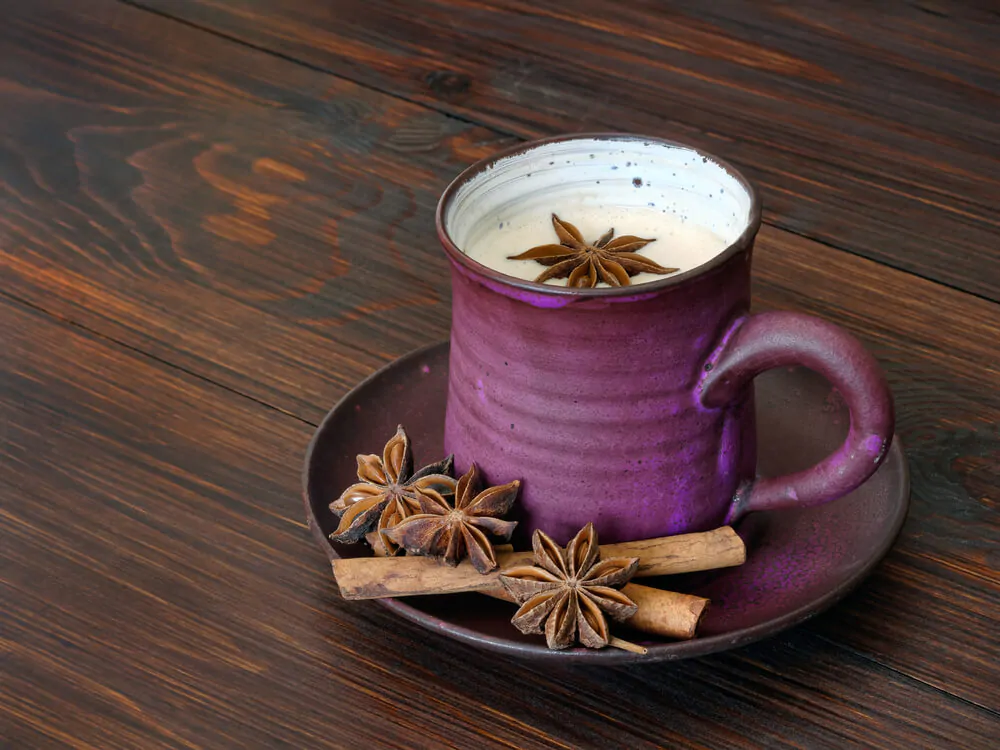Does Chai Latte have caffeine? We find out.

Chai lattes originally come from India and have become increasingly popular in the western world. This drink is known for its beautiful spicy, sweet and creamy flavor.
If you have not had the opportunity of trying one yet, I would highly recommend getting yourself a cup from your nearest coffee shop. However, one thing many of you may be asking is, does it have caffeine.
Chai has caffeine in it; in an 8-ounce cup, it has 40-110 mg of caffeine. The caffeine comes from the black tea it is made with.
Although the type of tea (Assam, Darjeeling, or Keemun) and its preparation will alter the caffeine content, The longer the tea brews, the higher the caffeine content.
Caffeine is a stimulant that gives our brains and bodies a bit of a push when tired or after a long morning of working. Caffeine may be an essential aspect to some of us, and to others, we want to cut it out for specific health reasons. So it may be helpful for us to look at how much caffeine Chai has if we can increase the caffeine and if it can be cut out.
Is There Caffeine In A Chai Latte

Some of us are concerned and interested in the caffeine levels of certain drinks we consume. We may want more caffeine to help us get through the day, or we may be interested in lowering our caffeine intake for different reasons.
A chai latte is made from black tea, milk, sugar, and a mixture of spices, the main ones being cardamom, cinnamon, cloves, ginger, and black pepper. The black tea used to make a traditional Chai latte is the only ingredient that contributes to its caffeine content. We will look at how much caffeine is in a traditional cup of Chai in this section.
Most recipes use black tea, which contains about 40 to 110 milligrams of caffeine per 8-ounce cup. The total caffeine per cup depends on the type and origin of the tea and how it is prepared.
The black teas typically used to make Chai latte are Assam, Darjeeling, and Keemun. In a cup of Assam tea, there are about 60 to 112 milligrams of caffeine.
Darjeeling tea contains 40 to 70 milligrams, and Keemun has 40 milligrams of caffeine per cup of tea. The tea preparation is essential because the longer it steeps, the more caffeine it will contain. For example, a cup of Earl Grey tea will have 40milligrams of caffeine in water at 194-203°F (90-94°C), whereas if it steeps for 3 minutes, it will increase to 59 milligrams.
How Much Caffeine Is In Different Chai Products?

So as Chai has become increasingly popular in many Western countries, the recipe has been altered, and different Chai latte products are being sold. This includes Chai made with varying types of tea that are not similar to the traditional Chai latte. It also includes powdered products and even syrups which many companies use, for example, Starbucks.
These different products will have different amounts of caffeine as they use other ingredients. Let’s look at some of the different teas used; some are used because of their reduced caffeine content, as some want to reduce their intake. Using green tea will provide a low caffeine amount of 25 to 29 milligrams of caffeine per 8-ounce cup.
A Chai latte made with herbal tea, such as rooibos, has 0 milligrams of caffeine in it. These herbal teas are usually more subtle in flavor, which may reduce the taste of your Chai latte. Other teas with no caffeine include decaf; this would be better for flavor compared to the herbal teas, this still has the same flavor as black tea without the caffeine.
Chai products such as syrups and powders also have different amounts of caffeine. Most Chai syrups will have no caffeine content, whereas powders have about 25 to 55 milligrams per 8-ounce cup. The amount will also be dependent on the brand you decide to buy.
Another product you could buy is a Chai concentrate you could also get; it has 30 to 35 milligrams of caffeine per cup. The USDA has noted that other recipes contain less than 22 milligrams of caffeine per 8-ounce cup.
What Affects The Caffeine Content Of A Chai Latte?
A few other factors can affect the amount of caffeine you have in each cup of Chai latte. Some of them are the type of product used, the brand quality, and how it is prepared.
Let’s look at some of them:
- Teabags with broken tea leaves will increase the caffeine content of your drink compared to whole tea leaves.
- The number of tea leaves that are added to your drink will also affect the amount of caffeine. Some brands will have slightly different amounts of tea leaves per bag, which will also affect the amount of caffeine.
- The amount of time you allow your teabag to steep for, the longer it is, the more caffeine your drink will contain.
- The quality of the tea brand you decide to use will also affect the caffeine content. The higher the quality of black tea, the more caffeine it will have, whereas the higher the quality of green tea, the lower the caffeine content.
These are just a few aspects that may help you understand why some teas and drinks have different amounts of caffeine in.
Final Word On does chai latte have caffeine
Chai is becoming increasingly popular in the Western world, meaning many brands and products with different recipes are available. Each of these recipes is made uniquely using the foundation ingredients but in different amounts. This can affect things like the caffeine amount, which may be something you are interested in knowing.
The main product in a Chai latte that adds caffeine is the black tea, the traditional ones used are Assam, Darjeeling, and Keemun. Alternatives can be used if you want your drink to have no caffeine; some will have a similar flavor, and others will be reduced.
